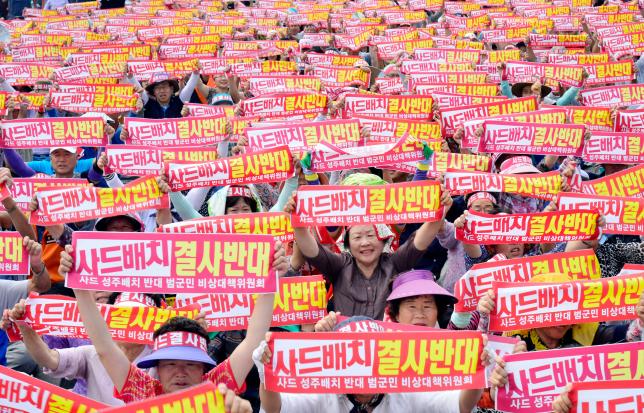Alwaght- Thousands of South Koreans have come out in the streets to protest the stationing of United States THAAD missile system in the country.
Seoul and Washington say the system is intended to both counter threats in the region and defend US troops stationed there. It forms the core element of the America’s multilayered defense program. On Wednesday, Seoul revealed that the US-built Terminal High Altitude Area Defense, THAAD, will be located in Seongju town, 217 km southeast of Seoul.
"South Korea and the US' joint working group have proposed the Seongju area, North Gyeongsang Province, as the optimal place for the deployment ... and the countries' defense ministers have approved it," the Ministry of National Defense's Deputy Minister for Policy Yoo Jeh-seung announced on Wednesday.
This led to no less than 5,000 farmers gathering in protest, according to Yonhap. Opposition continues to be so fierce that some officials have gone on hunger strikes. This was followed by the county’s Governor Kim Hang-gon writing a letter to Seoul in his own blood, as the attendees observed.
“We oppose THAAD with our lives!” residents chanted, holding banners inscribed with the same words.
“If we lose our precious land to THAAD, we will be ashamed before our ancestors and posterity,” the governor told those in attendance, comprised in large part of melon farmers. The county of about 50,000 provides 60 percent of South Korea’s melons.
Local residents fear it will lead to deteriorating health and will negatively impact the agricultural economy. The system’s high-powered radar has been linked to infertility and cancer, according to local sources, which the government denies.
Washington and Seoul claim that THAAD is intended to deter threats from North Korea but Russia and China have objected to the missile system.
In Beijing, Foreign Vice-Minister Zhang Yesui summoned the US and South Korean envoys to protest the THAAD deployment, saying it would “seriously damage” China’s strategic security interests and undermine the balance of security in the region. Neither would it be conducive to maintaining peace and stability in Northeast Asia, Zhang said.
The Russian foreign ministry said in a statement: “This missile defense system tends to undermine stability in the region ... We hope that our partners will avoid any actions that could have irreparable consequences.” Russian media quoted Yevgeny Serebrennikov, the deputy chair of the arms committee in the upper house, as saying Russia could respond by deploying missile and ground units in the country’s eastern regions.



























